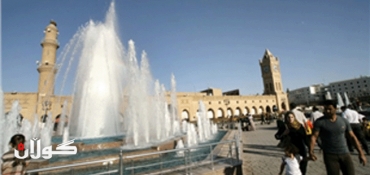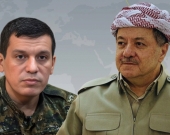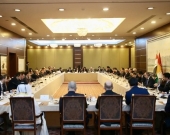Iraq’s Kurdish region pursues ties with Turkey — for energy revenue and independence

In many ways, Iraqi Kurdistan already acts like a sovereign state. Kurdish authorities provide all public services, command their own army and control their own borders — including their heavily guarded southern border with Arab-majority provinces of Iraq. In Irbil, the Kurdish capital, most government buildings fly the Kurdish flag — not the flag of Iraq — and many members of the younger generation never learned Arabic and speak only Kurdish.
Until now, however, the Kurds have remained tightly tied to Baghdad because they depend on the Iraqi treasury for the vast majority of their regional budget.
That could soon change.
Putting aside years of hostility, Turkish and Kurdish leaders are quietly implementing an energy partnership agreement, signed earlier this year, that promises to provide the Kurdistan region with an independent stream of oil revenue.
The first major step in the plan is a pipeline that runs directly to Turkey, beyond Baghdad’s reach, and that will begin operating by the end of the year, according to the Kurdistan region’s minister of natural resources, Ashti Hawrami.
“It is our duty as Iraqis to pursue export routes for oil and gas, to secure our future,” Hawrami said.
Turkey’s turnabout
Iraqi Prime Minister Nouri al-Maliki and the Obama administration have balked at Turkey’s budding alliance with the Kurds, saying that it could further destabilize Iraq. They worry that a push toward Kurdish nationalism could raise ethnic tensions with Iraq’s Arab majority, especially those who live along the disputed boundary between the Kurdistan region and the rest of the country.
More than 5,500 people have been killed in attacks in 2013, Iraq’s deadliest year since 2008. The Kurdistan region has remained safe, with the exception of one major attack on an intelligence headquarters in the Kurdish capital, Irbil, in September. But the war in neighboring Syria has helpedreenergize al-Qaeda’s Iraqi affiliates, which are waging an escalating campaign of bombings, assassinations and prison breaks.
Leaders in the Kurdistan region have tried to quell the concerns of Iraqi and American officials, giving assurances that they have no plans to formally secede from Iraq, even as they lay the groundwork for increasing autonomy.
“Independence is an aspiration in the heart of every Kurd,” said a senior Kurdish official, speaking on the condition of anonymity because of political sensitivities. “But we need to be strategic.”
Ironically, Turkey could become a key enabler of Kurdish dreams.
In the past, Turkish leaders opposed political autonomy for Iraqi Kurds, for fear that Turkey’s own sizable Kurdish minority might be emboldened toward separatism.
As recently as 2008, Turkey massed tens of thousands of troops on its southern border and launched major ground attacks on Kurdish militants in Iraqi territory, prompting Kurdish regional President Massoud Barzani to threaten violent retaliation.
By Ben Van Heuvelen
Washington Post












